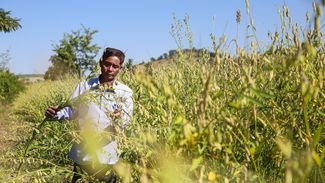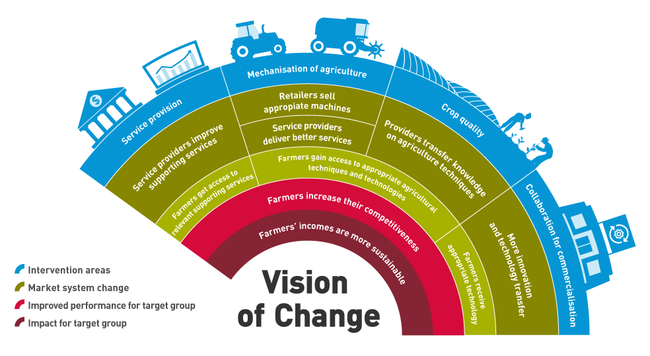Climate change, poverty and the lack of food security – a Swisscontact project in Cambodia is tackling all three challenges. By upgrading their agricultural methods, farmers can increase their yields and protect the environment.

Cambodia needs to reinvent its outlook on agriculture as yields on their arable farmland are decreasing. New agricultural technologies are indeed available and might help to improve productivity. Many of these solutions are not sufficiently commercialised to the point that they might reach broad numbers of farmers. The capacities of public agricultural extension services that are supposed to extend new skills are quite limited.
Swisscontact’s Mekong Inclusive Growth and Innovation Programme (MIGIP) aims to tackle these challenges together with various partners.
Plants require CO2 to grow. They filter the greenhouse gas from the air and trap it in the ground where it is stored. If, however, the ground cannot store enough CO2 – as is the case in Cambodia – then soil fertility decreases and with it, productivity as well. The poor soil fertility often leads to more forest being cut down.
Swisscontact wants to help farmers break out of this vicious circle. With the “conservation agriculture” approach, soil fertility improves within a relatively short period. Conservation Agriculture (CA) is a farming system that contributes to the prevention of arable land loss and regenerates degraded soils through the adoption of polyculture, crop rotation, cover crops, and no-till-planting. Through these measures, the earth can regenerate and becomes fertile once again.
The method is not new in Cambodia. Since 2004, the Department of Land Resources Management with the support from CIRAD have been working on innovative cropping systems and practices based on the principles of Conservation Agriculture. These practices have been designed and tested in different agroecosystems of Cambodia. Results from these scientific studies showed that Conservation Agriculture Production Systems improved soil fertility, reduce labor, conserved water and increased yield and income for smallholder farmers. Building upon the much-needed research, Swisscontact joined hands with other partners (CE SAIN/RUA, SIIL/Kansas State University, Department of Engineering, DALRM, CIRAD) to commercialize the adoption process. Swisscontact, through its MIGIP project, utilized its Inclusive Market Approach with a focus on enterprise development, especially in strengthening the accessibility of conservation agriculture technology and inputs such as cover crops and appropriate mechanisation.
Most Cambodian farmers do not own agricultural machinery but rent the requisite services from local agricultural service providers. For 25 dollars a farmer can have a field the size of a football pitch tilled. To spread sustainable agricultural practices, Swisscontact is working with agricultural machinery service providers. The commercialisation of appropriate machinery is a catalyst to ensure the momentum of CA practices adoption. Through cooperation with the farmers' service providers, the new agricultural methods can be sustainably rooted. Swisscontact also works closely with the government and the research institutes so that the practices are adopted at the national level.
“The scaling-up of technologies is only possible if there is an incentive for the actors involved in the process. For farmers to practice no-till planting, these services must reach the farmers. The business model to reach farmers in Cambodia is through tractor service providers. Swisscontact works with importers of tractors and no-till planters and helps them promote to the service providers,” says Rajiv Pradhan, MIGIP Programme Manager.
If many farmers adopt sustainable agriculture, that will prevent deforestation, improve soil fertility, and conserve water usage. On the micro-level as well, this method ensures profitability for farmers. Sustainable agriculture responds to the most pressing social and environmental challenges Cambodia faces.
The goal of MIGIP is to foster inclusive economic growth that helps to create jobs and increase incomes. In addition to agriculture, another project component focuses on tourism. MIGIP is a four-year programme (2017–2020) financed by the Swiss Agency for Development and Cooperation (SDC), Aargau Canton, the Happel Foundation, and the Kuoni and Hugentobler Foundation.
By the end of 2020, MIGIP will increase incomes of 3,200 smallholder farmers and 300 tourism SMEs in Cambodia.
Each of the projects that Swisscontact implements develops a “Vision of Change”. This vision involves imagining how a system might work better in the future. The Vision of Change allows the project team to keep their eye on the end goal and plan subsequent activities accordingly. The Mekong Inclusive Growth and Innovation Programme (MIGIP) has been implementing this vision since the start of the project:


Swisscontact is collaborating closely with the Cambodian Ministry of Agriculture, Forestry and Fisheries (MAFF) to promote Conservation Agriculture (CA). We met Dr Saruth Chan, Undersecretary of the MAFF, for an interview.
What is the ministry’s vision for the agriculture sector in Cambodia?
The Ministry of Agriculture, Forestry and Fisheries (MAFF) has set out its vision in alignment with the Royal Government of Cambodia’s strategy to convert Cambodian agriculture into modern agriculture, meaning that it becomes competitive, resilient to climate change, and sustainable. This will all result in increased income, prosperity, and welfare of famers and all Cambodians.
Why does Cambodia need to implement Conservation Agriculture (CA) practice?
Conservation Agriculture promotion is among the prioritised key activities to support the ministry’s vision in agriculture sector development and sustainability. Results through years of research proves that the adoption of CA will help Cambodian farmers to be better mitigated and adapted to the potential risks of climate change. In the long run, CA will reduce agricultural, ecological, as well as, economic burdens. This also resonates with Cambodia’s effort in achieving the United Nations Sustainable Development Goals SDG 1 (no poverty), SDG 2 (zero hunger), SDG 13 (climate action) and SDG 15 (life on land).
What is Swisscontact’s contribution?
Swisscontact is a coordination body that catalyses commercialisation of appropriate CA technologies, including machinery and cover crop seeds. The involvement of the organisation as a bridge connecting the technical ministerial departments, research institutions, private companies and end-users constructs an enabling environment for all actors to synergise the growth of CA practice. Swisscontact has been instrumental in coordinating various key actors to come together to form the concept and facilitate the implementation of necessary measures to ensure the market system functionalities around Conservation Agriculture Production Systems.
Swisscontact
Swiss Foundation for Technical Cooperation
Hardturmstrasse 123
CH-8005 Zurich
Tel. +41 44 454 17 17
Fax +41 44 454 17 97
E-Mail info@swisscontact.org